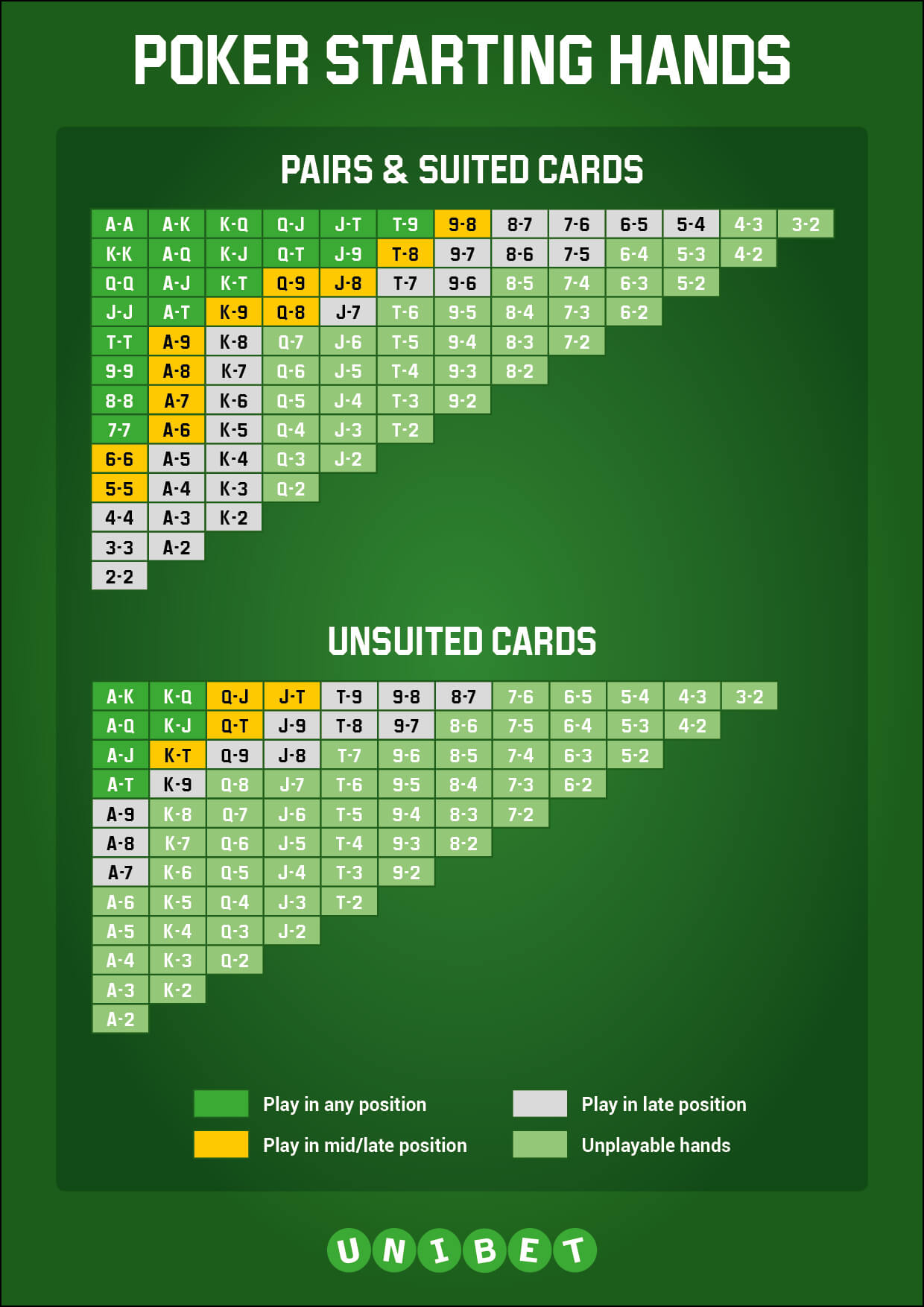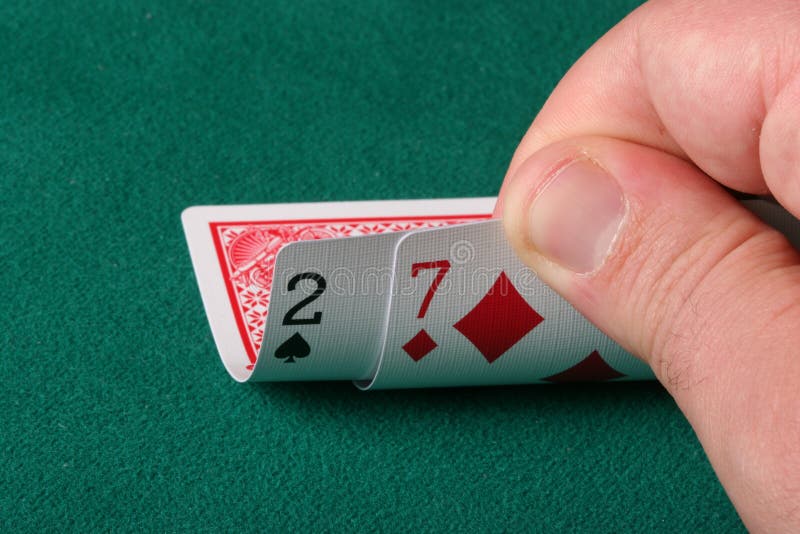- A regular 52-card deck has almost 1,350 starting hands, good, moderate and bad. Discussed below are the worst and best starting hands in a Texas Holdem poker card game.
- It just appears that way sometimes due to the incredible speed of online poker. Because online poker sites like PokerStars typically deal hands 3 times faster than a live poker game, you should expect 3 times as many bad beats. This is even more pronounced in Zoom Poker which can deal hands up to 10 times as fast as a live poker game.
Bad starting hands in Texas Holdem poker: 2-7 offsuit – this is the worst starting hand you can receive in Texas Holdem poker. You have no chance to make even straight draw, so when you are dealt these two cards it is better to fold. 2-8 offsuit – this is also a very bad hand and when you receive it you should consider folding. The only advantage of 2-8 offsuit hand over 2-7 offsuit hand is that 8 beats 7. Other bad hands are 3-8, 2-9 and 2-6 all offsuit. As you see with these hands you.
Bad Poker Starting Hands Guide

- General Guidelines
- Seven Card Stud
- Limit Texas Hold'em
There are five categories of limit hold 'em starting hands that we will discuss: Big pairs, small and medium pairs, two high cards, suited connectors, and big-little suited. Most other hands should be thrown away unless you have the big blind and the pot has not been raised.
Big pairs.

A pair of tens and higher is an excellent starting hand. With a high pair, you not only can make an even bigger hand, but also can completely miss the board — your hand does not improve — and still have a reasonable opportunity to win the pot. Obviously, the chances of winning with two aces are better than the chances of winning with two tens. In general, however, all high pairs have immediate value and should be played aggressively.
Small and medium pairs.
In hold 'em, as in seven-card stud, there is a big difference in strength between big pairs and smaller pairs. A hand like the
seldom wins the pot without improvement. Moreover, the odds against this hand improving to three of a kind on the flop are almost 8-to-1 (although you still can flop a straight draw).
Since small and medium pairs rarely win without improving, they have little immediate value and therefore can be classified as drawing hands. And to profitably play these hands, you need several opponents in the pot.
Best Poker Starting Hands Hold'em
Two high cards.
Two unsuited high cards is usually a playable hand but not a great hand. Even though ace-king almost always should be played, a hand like theoften should be folded, especially if someone has raised. In addition, this hand must hit the flop to win in a multiway pot.
If your hand is suited, you should be more inclined to play. But remember the warning given earlier: Don't overrate the value of two suited cards.
Bad Poker Starting Hands Chart
Suited connectors.
Hands like theare only fair at best. And if your hand contains a gap, you cannot play it as often since your straight possibilities have decreased. This type of hand usually should be thrown away in early position, and you should not call a raise even from a late position unless many players are already in the pot.
Big-little suited.
An ace or a king with a small card of the same suit is similar in value to the suited connectors and should be played as such. Of course ace-little suited is better than king-little suited.
Starting Hand Quiz
1. What hands are you primarily interested in playing?
Big pairs and high cards, especially suited high cards.
2. How do you play these hands?
Aggressively. Almost always raise, and with the better hands, usually reraise.
Poker rules list. 3. Suppose two players are already in the pot. The first player has raised, the second has called, and you hold two kings. What should you do?

Raise again. You have a strong hand and would prefer to shut out the remaining players.
4. In what situation do small pairs play best?
In a many-handed pot.
5. When you play a small pair, what are you hoping to do?
To make three of a kind on the flop.
6. When do suited connectors play best?
When many opponents are in the pot.
7. You are in one of the blind positions, someone has raised, and there are several callers. What kind of hands should you play?
All of the good hands, plus all pairs and many of the hands that can make straights and flushes.
8. Which hand is better, ace-jack offsuit or eight-seven suited?
Normally, ace-jack offsuit is the better hand. But when a lot of players are in the pot, you would prefer to hold the eight-seven suited. In this spot, don't overplay a hand like ace-jack.

- General Guidelines
- Seven Card Stud
- Limit Texas Hold'em
There are five categories of limit hold 'em starting hands that we will discuss: Big pairs, small and medium pairs, two high cards, suited connectors, and big-little suited. Most other hands should be thrown away unless you have the big blind and the pot has not been raised.
Big pairs.
A pair of tens and higher is an excellent starting hand. With a high pair, you not only can make an even bigger hand, but also can completely miss the board — your hand does not improve — and still have a reasonable opportunity to win the pot. Obviously, the chances of winning with two aces are better than the chances of winning with two tens. In general, however, all high pairs have immediate value and should be played aggressively.
Small and medium pairs.
In hold 'em, as in seven-card stud, there is a big difference in strength between big pairs and smaller pairs. A hand like the
seldom wins the pot without improvement. Moreover, the odds against this hand improving to three of a kind on the flop are almost 8-to-1 (although you still can flop a straight draw).
Since small and medium pairs rarely win without improving, they have little immediate value and therefore can be classified as drawing hands. And to profitably play these hands, you need several opponents in the pot.
Best Poker Starting Hands Hold'em
Two high cards.
Two unsuited high cards is usually a playable hand but not a great hand. Even though ace-king almost always should be played, a hand like theoften should be folded, especially if someone has raised. In addition, this hand must hit the flop to win in a multiway pot.
If your hand is suited, you should be more inclined to play. But remember the warning given earlier: Don't overrate the value of two suited cards.
Bad Poker Starting Hands Chart
Suited connectors.
Hands like theare only fair at best. And if your hand contains a gap, you cannot play it as often since your straight possibilities have decreased. This type of hand usually should be thrown away in early position, and you should not call a raise even from a late position unless many players are already in the pot.
Big-little suited.
An ace or a king with a small card of the same suit is similar in value to the suited connectors and should be played as such. Of course ace-little suited is better than king-little suited.
Starting Hand Quiz
1. What hands are you primarily interested in playing?
Big pairs and high cards, especially suited high cards.
2. How do you play these hands?
Aggressively. Almost always raise, and with the better hands, usually reraise.
Poker rules list. 3. Suppose two players are already in the pot. The first player has raised, the second has called, and you hold two kings. What should you do?
Raise again. You have a strong hand and would prefer to shut out the remaining players.
4. In what situation do small pairs play best?
In a many-handed pot.
5. When you play a small pair, what are you hoping to do?
To make three of a kind on the flop.
6. When do suited connectors play best?
When many opponents are in the pot.
7. You are in one of the blind positions, someone has raised, and there are several callers. What kind of hands should you play?
All of the good hands, plus all pairs and many of the hands that can make straights and flushes.
8. Which hand is better, ace-jack offsuit or eight-seven suited?
Normally, ace-jack offsuit is the better hand. But when a lot of players are in the pot, you would prefer to hold the eight-seven suited. In this spot, don't overplay a hand like ace-jack.
9. If there is no raise, what hands do you call with out of the little blind?
Even though you can get in for only a partial bet, you still need to be somewhat selective. Routinely playing hands like the
eventually will prove costly. In other words, you still should discard your worst hands.
10. If someone has raised, how does this affect the hands you should play?
Generally, you need to be much more selective. Small pairs and medium suited connectors do not play well against a large pair, and when someone raises, he's quite likely to be holding a large pair. In addition, a raise makes it doubtful that a lot of players will enter the pot. This means you will not get the implied odds — the amount of money you anticipate winning versus the amount you expect it to cost you — that many hands require to be profitable.
11. When should you play a hand like king-four suited?
When you are in a late position, several players are already in, and the pot has not been raised.
12. When you have a close decision regarding whether to play a hand, what should you consider?
In hold 'em, as in seven-card stud and all other forms of poker, you must take into account how well those opponents already in the pot play. The better they play, the less inclined you should be to go up against them.
Poker Strategy and Other Topics - November 2019
by Carlos Welch
by Robert Samuels
by Kevin Haney
by Kevin Haney
by Ben Saxton
by Bryan Clark
by Felipe Garcia, CFA and Aaron Byrd, CFA
by Nick Willett
by Mason Malmuth